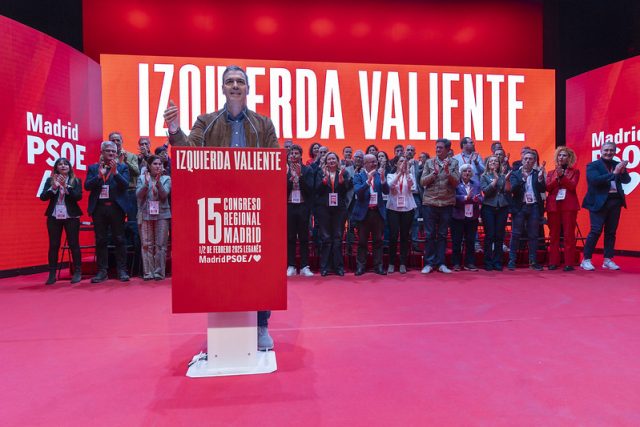
Socialist Prime Minister Pedro Sánchez closed the Madrid Socialist Party (PSOE) Congress with a forceful speech focused on criticising Isabel Díaz Ayuso, the regional president of the Community of Madrid, and one oh his main rivals in the national political arena.
The speech reflected the growing divide between Spain’s major political parties, as Sánchez targeted both political adversaries and influential economic sectors.
The congress provided Sánchez with an opportunity to rally support within his party.
With the PSOE in Madrid facing significant difficulties in competing with the centre-right government led by Ayuso, Sánchez sought to energise his base by drawing attention to controversies surrounding the regional administration. Referring to a longstanding urban planning dispute, he questioned Ayuso’s leadership and demanded accountability. However, critics pointed out that no new evidence was presented to substantiate his call for her resignation.
Sánchez himself, as well as close family members, have been the object of currently ongoing corruption probes for alleged influence peddling.
His speech, however, did not focus solely in Madrid politics.
In his speech, he expressed concerns about what he described as a growing influence of “far-right” elements in Spain’s political sphere. He warned of what he termed a “far-right multinational,” which he claimed seeks to undermine democratic institutions, a termed that has been consistenly rejected by Conservative parties in Spain.
Another central theme of the speech was economic policy, particularly regarding large financial institutions and wealthy individuals.
He criticised banks and large fortunes, arguing that their practices have contributed to social inequality. This rhetoric, consistent with his government’s focus on social welfare and labour reforms, was criticised by political opponents who argued that such statements could alienate key investors and employers crucial to economic growth.
In response to the criticisms directed at the opposition, members of the Partido Popular (PP) defended Ayuso and accused Sánchez of using deflection tactics. They highlighted ongoing corruption investigations involving PSOE officials as evidence that the government should prioritise its own internal reforms.
Sánchez’s supporters, however, pointed to his administration’s initiatives aimed at promoting transparency, including measures to strengthen anti-corruption regulations and improve oversight within public institutions.
The congress also revealed the strategic challenges facing the PSOE in Madrid. Historically, the region has been a stronghold for centre-right politics, and the PSOE has struggled to gain traction despite efforts to revitalise its leadership and political platform. Sánchez’s speech was seen as an attempt to unify the party’s regional wing and bolster its standing ahead of future elections. Party officials emphasised the importance of presenting a coherent alternative to Ayuso’s administration, focusing on issues such as healthcare, education, and housing affordability.
The tension between the PSOE and its opponents reflects broader challenges in Spain’s political environment, characterised by polarisation and competing narratives. On the one hand, Sánchez’s government seeks to position itself as a champion of social justice, aiming to reduce inequalities and protect democratic institutions. On the other hand, critics argue that the government’s approach risks alienating key sectors of the economy and exacerbating divisions within Spanish society.
As political debate intensifies, both the government and the opposition face the task of addressing citizens’ concerns with concrete proposals. Economic recovery, public services, and democratic stability remain key priorities for voters. Analysts note that while confrontational rhetoric may serve to mobilise party supporters, sustainable governance will require greater collaboration across political lines.
Ultimately, the Madrid PSOE Congress highlighted the deep political divide shaping Spain today. For the Sánchez administration, the challenge lies in balancing political messaging with the delivery of tangible results. The coming months will likely test the effectiveness of the government’s strategy, as it faces mounting pressure from both its supporters and critics to provide solutions to Spain’s economic and social challenges.



 Subscribe
Subscribe